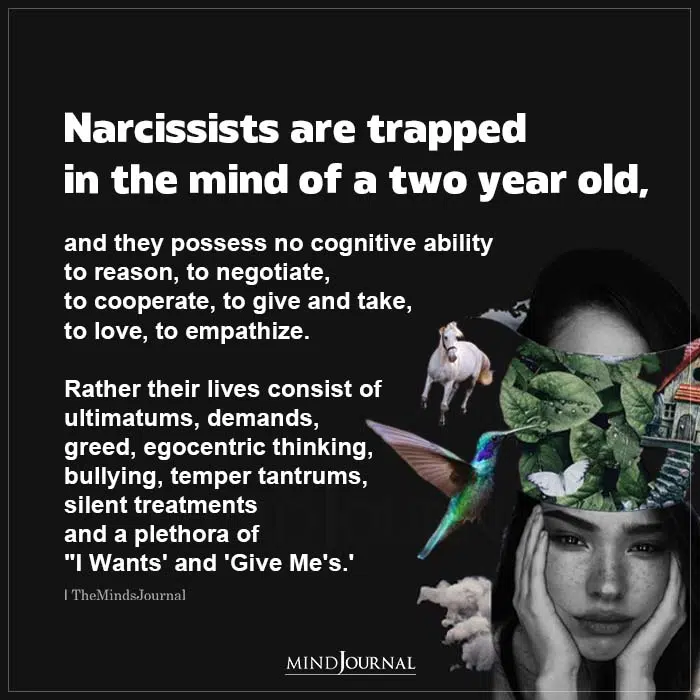Have you always found it hard to navigate a narcissist’s manipulative ways? If yes, then these facts about narcissists might help you understand them and their ways better. Understanding the science of narcissism is crucial in countering them and their manipulative ways.
“Narcissism falls along the axis of what psychologists call personality disorders, one of a group that includes antisocial, dependent, histrionic, avoidant, and borderline personalities. But by most measures, narcissism is one of the worst, if only because the narcissists themselves are so clueless.” ~Jeffrey Kluger
A report in Cosmopolitan Magazine offers ten very insightful points into the psyche of your everyday, average narcissist – and if you keep these in mind when you’re dealing with one, you’ll find yourself feeling much more in control of the situation.
Need more help dealing with your narcissist? Check out my most recent book, Take Back Your Life: 103 Highly-Effective Strategies to Snuff Out a Narcissist’s Gaslighting and Enjoy the Happy Life You Really Deserve (Detoxifying Your Life Series) at Amazon.com.
Facts that will help you understand narcissists better
Related: 20 Narcissistic Terms: A Glossary of Terms for Understanding Narcissists
10 Shocking Facts About Narcissists They Don’t Want You To Know
1. You can’t shame a narcissist.
They’ll make your life much harder if you do.
Do not try to shame a narcissist – they will make you pay big time.

2. The reason they’re so fragile and insecure on the inside and mean and hateful on the outside goes all the way back to childhood.
Though researchers believe there might be a genetic component, the truth is that the way a child is raised has a great deal to do with how they turn out.
Narcissists get broken in childhood most of the time. More environment and less genetics.
Also of note:
- There are two ways to “create” a narcissist – by denying a child unconditional love so they never feel comfortable in the emotional love or by totally going the opposite direction and overindulging, overpraising, and under-disciplining the child – making them believe they’re overly special.
- This would indicate that the term “happy medium” could apply to good parenting (My note)
3. Kids who got big responsibilities at early ages are more often narcissists than those who didn’t.
Whether it was direct responsibility such as for a sibling or indirectly such as for the emotional health of a parent.
This leads to their adult selves always seeking approval and trying too hard, never allowing themselves to just “be,” but rather requiring to be the center of attention.
Too many big responsibilities at an early age can create a narcissist.
Related: Narcissistic Personality Disorder: Understanding Them And Ways To Better Tolerate Them
4. A narcissist desperately needs to feel superior to everyone around him.
Because inside they don’t feel like they’re good enough. And they react with contempt to anyone who seems to have something they lack.
Narcissists need to feel like they are better than you – and they will hate you if they think otherwise.
5. Narcissists think big.
That is, they are grandiose thinkers because they feel like it fills some hole inside themselves.
Narcissists are grandiose thinkers. They want to fill a big hole inside themselves.
6. They have a huge sense of entitlement.
They think they DESERVE to have what they want without regard for the needs and desires of those around them.
Narcissists almost always have an overblown sense of entitlement.
7. They haven’t met a boundary they haven’t crossed.
And if you don’t put a stop to it when it begins, they’ll keep crossing until they’ve crossed every boundary you’ve got.
Narcissists cross every boundary you have.
Related: The Narcissistic Dictionary: Terms That Describe Narcissistic Behaviors
8. If you must confront a narcissist, do it carefully.
They respond best to “empathic validation,” Cosmo says. So you should always “affirm the relationship first before you share anything that doesn’t feel right,” said a psychologist interviewed by the mag.
“For example, if it’s someone you’re dating, say to them: ‘I care about you a lot, so when you don’t listen to what I’m saying, I feel like I’m nothing in your eyes,’ instead of ‘Why don’t you ever listen to me?’
If you must confront a narcissist – use emphatic validation.

9. The only thing that might motivate a narcissist to change is having a meaningful consequence for their bad behavior.
For example, a healthy narcissist might avoid cheating on a spouse in order to preserve the relationship, because “if the consequences are high enough, they might start to reevaluate their actions.”
Narcissists can be motivated by meaningful consequences for their behavior.
10. No matter how intelligent and together a narcissist is in other ways, they are emotional toddlers.
Cosmo’s experts both noted that the best way to deal with a narcissist who is raging is to consider them like you would a two-year-old who is throwing a tantrum, and that most of that is just their way of “putting on a show.”
Both agreed that as long as you’re not in physical danger, you have to pick your battles and decide what you will and will not tolerate, and then make your choices accordingly.
Narcissists are like emotional toddlers.
Related: Science Of Narcissism: 24 Terms Of Narcissistic Abuse That You Should Know About
As I said, I find all of this stuff very insightful and totally on-target. What do you think?
Want to know more about the most important facts about narcissists? Check this video out below!
Written By Angie Atkinson
Originally appeared on Queen Beeing
Article printed here with permission











Leave a Reply
You must be logged in to post a comment.